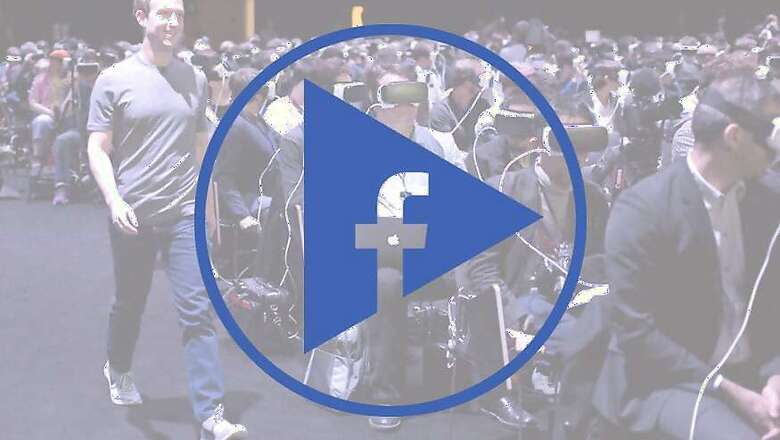
views
It has been more than 125 years since the first moving images made their appearance. Film and video have altered communication, entertainment, and popular culture like never before. This change that was first brought in by film, then television, and was accelerated with home video. Now digital video is taking things to a different level.
That video has been the major force in recent human history is undeniable. But will video obliterate all other mediums of communication?
Facebook wants us to believe so. And says this change will happen in a mere five years from now. There appears to be more of marketing in this assertion than real vision.
It is also important to keep in mind that Facebook isn't the web. But the Menlo-Park-based tech giant is envisioning a future where its service(s) is synonymous with the web. At some places, the lines have already started to blur.
Mark Zuckerberg has been selling this video dream to publishers and users alike for a while. Now other Facebook executives are also eagerly pressing the play button.
The largest social networking service has been a latecomer to the video revolution. Online video is now dominated by Google-owned YouTube.
The world is moving to a faster bandwidth and video consumption is rising. Facebook is, understandably, all geared up to cash on it.
Of late, Facebook has been quite aggressive in its video push and is also incentivising publishers to put up more videos on its platform. Video offers an additional peep into user behaviour and preferences and is also a lucrative advertising platform.
Video is a powerful medium of communication and newer forms such as live streaming from phones and 360° video are attracting user interest. But then, there is a big difference between interesting and revolutionary.
The video revolution is already past us and what we are seeing now is merely a progression. Even with television, there were fears that TV would kill the newspaper. It didn't (in the same way as video couldn't really kill the radio star).
Newspapers may be losing readership in many parts of the world but then it is because of the internet and not video.
Video isn't a ready replacement for text, which has been an integral part of human civilisation for thousands of years. Facebook agrees that text will exist, but because users will need to write for video.
Facebook can choose to ditch text for video. After all, they can take the calls for the service that they run. But for users and much of web content producers, text will remain the primary medium of communication because the advantages of the written word are too many to be streamed away.
Text is easily computable and scannable. Video isn't. Text lends itself naturally to search (a technology that accelerated the web). Video, not so.
Quality video often takes much longer to produce. Also needs more men and money than to create text. Video can't beat text on ease. And simplicity is a big factor in the online success.
The relative anonymity that the internet provides has been one of the driving forces behind the exponential growth in digital communication. Video, because of its very nature, cuts down on anonymity. Not everyone is comfortable coming before a camera. This is a reason why many attempts at reviving video comments on website articles have failed.
Extensive video consumption needs high sustained bandwidth and preferably no data caps. This isn't yet a reality in much of the developed world, leave alone the world from where the next billion of internet users are supposed to come from.
Will this happen in the next five years? No.
Facebook is all gaga about video because it wants ALL the video on its own platform. It wants to be the YouTube. And to do so, it has to sound serious about video. This talk about Facebook going video-only is part of that marketing speak.
If video is a medium that users naturally opt for over other forms, why is Facebook having to push so hard for it? Be it via algorithmic tweaks to make more video surface on news feeds, through push notifications, or by promising incentives to publishers.
If video is that all-powerful medium of communication, why are the big Facebook announcements posted as texts (with video only featuring in a supporting role)?
Video will continue to evolve and grow. But it will, in all likelihood, not be the omnivore on top of the content food chain, devouring all that is below.



















Comments
0 comment